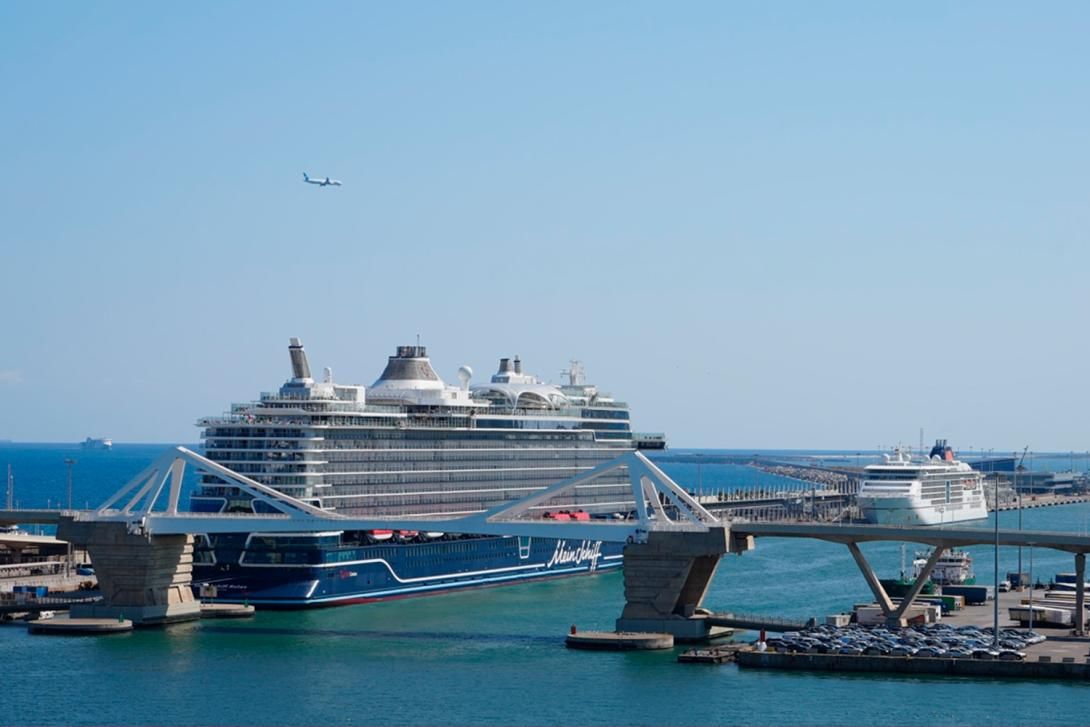The Mein Schiff Relax leads the first bioLNG supply to a cruise ship at the Port of Barcelona
The barge Haugesund Knutsen supplies 1,875 m3 of bioLNG to the TUI Cruises vessel in the first ship-to-ship biofuel supply operation at the Port of Barcelona.
BioLNG is a 100% renewable fuel derived from organic waste.

The Mein Schiff Relax, the first InTUItion class vessel of Hamburg-based TUI Cruises, has led the first bioLNG supply to a ship from a barge at the Port of Barcelona. The operation took place on Saturday, July 26, when the barge Haugesund Knutsen, from Knutsen Scale Gas and chartered by Shell, supplied 1,875 m3 of bioLNG from the regasification plant operated by Enagás at the port.
BioLNG, or liquefied biomethane, is considered a sustainable fuel by the European Commission due to its production process from organic waste. By utilizing this waste, it allows for a reduction of greenhouse gas emissions by between 70% and 100%, depending on the origin of the organic matter, throughout the production and consumption cycle. In practice, this circular economy process decarbonizes ship operations, in this case the Mein Schiff Relax cruise ship, in line with the decarbonization commitments set by the FuelEU Maritime Directive.
BioLNG has the same characteristics as fossil LNG, so it can be used by any ship equipped to operate with LNG, such as the most modern cruise ships operating at the Port of Barcelona, which are regularly supplied with LNG—specifically 23% of the calls registered in 2024. Transitioning from a transitional fuel like fossil LNG, which reduces CO2 emissions by 20% compared to traditional fuel, to a sustainable fuel like bioLNG represents a significant qualitative leap in the energy transition process and the reduction of greenhouse gas emissions in the freight transport sector, especially in maritime transport.
The operation to the Mein Schiff Relax cruise ship was the second bioLNG supply operation carried out at the Port of Barcelona. Last March, the shipping company Baleària loaded bioLNG onto one of its vessels, although that time the supply was carried out by tanker truck, unlike the ship-to-ship operation performed for the cruise ship. Supply from a barge significantly speeds up the loading operation, increasing the amount of fuel loaded by more than 15 times, thereby facilitating the adoption of emission-neutral fuels in the maritime sector and enabling the decarbonization of this activity.
The first ship-to-ship bio-LNG bunkering of the Mein Schiff Relax at the Port of Barcelona also marks a key milestone in delivering TUI Cruises’ Climate Protection Roadmap. With the clear ambition to be climate-neutral by 2050, the company follows a detailed plan based on four main levers: the increased use of alternative fuels, green shore power, energy efficiency, and optimized voyage planning. As the first LNG-powered ship in the fleet, the Mein Schiff Relax is a flagship of this transition—operating almost exclusively on LNG. All new vessels are equipped with dual-fuel engines and prepared for next-generation fuels, like the Mein Schiff 7, which was added to the fleet last year, will be able to use green methanol. Further efforts include catalytic converters, exhaust gas scrubbers, digital routing tools, and investments in efficiency technologies like advanced hull coatings and cleaning robots.
Kilometer Zero Operation
The supply operation to the Mein Schiff Relax could be described as a kilometer zero operation since it was carried out entirely at the Port of Barcelona, with the Enagás regasification plant at the Energy Wharf being the source of the supplied bioLNG. The Enagás terminal in Barcelona was recently certified according to the environmental, social, and traceability criteria established by the International Sustainability and Carbon Certification of the European Union (ISCC EU) and the European Commission, allowing the fuel supplied to be certified as bioLNG.



